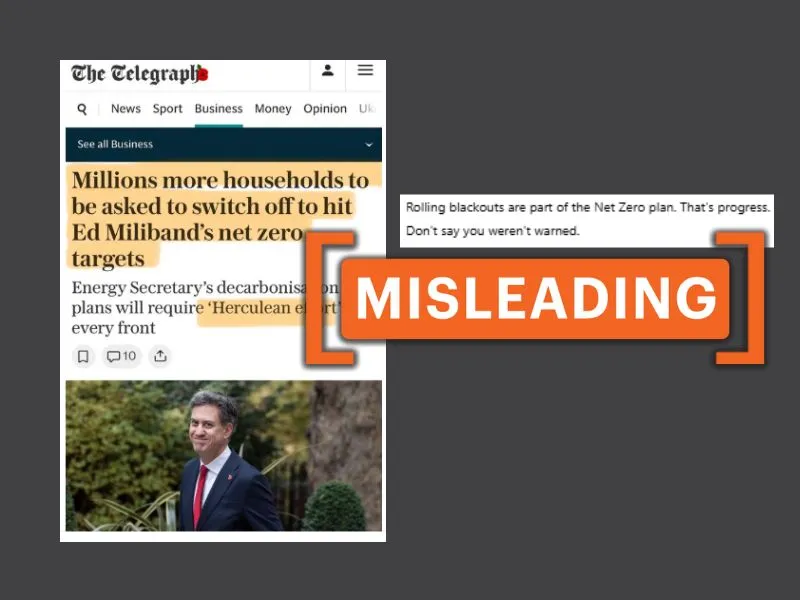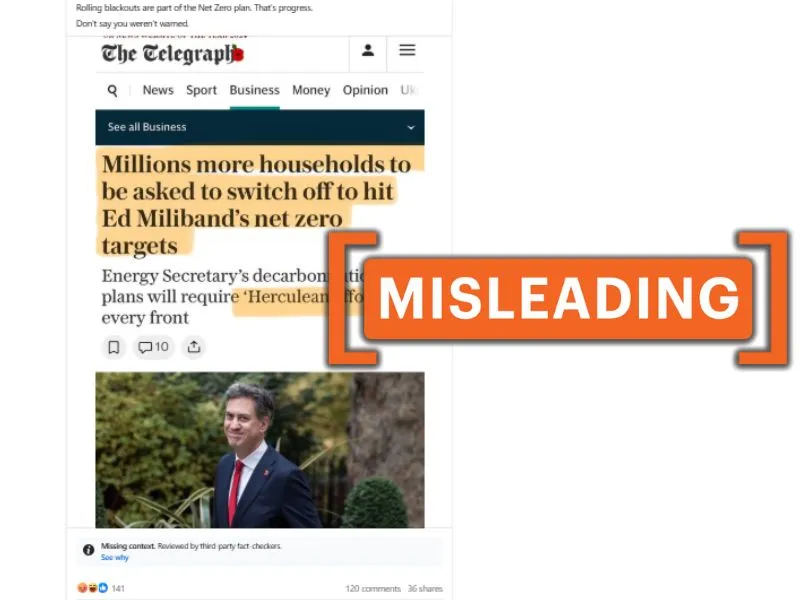By: Anurag Baruah
November 25 2024
 Screenshot of a Facebook post using the screenshot of a The Telegraph report to claim that rolling blackouts are part of the U.K.'s net zero plan. (Source: Screenshot/Facebook/Modified by Logically Facts)
Screenshot of a Facebook post using the screenshot of a The Telegraph report to claim that rolling blackouts are part of the U.K.'s net zero plan. (Source: Screenshot/Facebook/Modified by Logically Facts)
The U.K.'s net-zero plans emphasize flexibility with regard to electricity use without forced participation or blackouts, as confirmed by authorities.
What is the claim?
A screenshot purportedly showing the first section of a news report by the British daily The Telegraph is circulating on social media with the claim that “rolling blackouts are part of the net zero plan” of the United Kingdom (U.K.).
The report seen in the screenshot is titled ‘Millions more households to be asked to switch off to hit Ed Miliband's net zero targets’ and features a photo of Miliband, who currently serves as the U.K.'s Secretary of State for Energy Security and Net Zero.
A Facebook user posted the screenshot and wrote, “Rolling blackouts are part of the Net Zero plan. That's progress. Don't say you weren't warned.” The post has been picked up by many other users and shared across the social media platform. An archived version of the post can be seen here.

Screenshot of a Facebook post claiming that rolling blackouts are part of the U.K.'s net zero plan. (Source: Screenshot/Facebook/Modified by Logically Facts)
Rolling blackouts are temporary measures purposefully implemented by power grid operators to balance the electricity supply in a region. Unlike outages caused by damage to power lines or plants, they are planned to reduce disruption for local consumers. They are termed "rolling" because the outages rotate between areas, ensuring no location remains without power for an extended period.
However, we found no mention of resorting to rolling blackouts or power cuts in the latest U.K. net zero plans. Authorities confirmed this, and no such reports were found online.
What are the facts?
Taking a cue from the headline seen in the viral screenshot, we found the original The Telegraph report, published on November 5, 2024. The report is about recent advice published by the National Energy System Operator (NESO) that “a quadrupling of so-called flexibility is needed to ensure the grid can operate without the use of fossil fuels.”
The report added, “In practice, this means convincing larger numbers of households and businesses to voluntarily cut their electricity consumption during low-wind periods or times when the grid is otherwise constrained – either through higher prices or by paying them incentives.”
Additionally, using the word ‘voluntary’ in the report shows that it did not say that consumers would be forced to participate in reducing electricity consumption. Further, the text of The Telegraph report does not claim that Miliband or NESO advocated for completely switching off electricity as suggested in the headline, nor does it say that the government will implement blackouts or power cuts.
What did the authorities say about this?
Logically Facts contacted NESO to comment on the viral claim. A spokesperson directed us to publicly available documents on the same topic, the Clean Power for 2030 Advice to Government and the ‘Clean Power 2030’ report. On reviewing these materials, we found no mention of rolling blackouts or power cuts as a proposed measure on the path to U.K.’s net zero.
Instead, we found that the report discusses the benefits of consumers being flexible while using electricity, referred to as demand-side flexibility by NESO. It suggested various flexibility options for times when there is insufficient clean power to meet demand; however, power cuts are not featured among them.
For further clarity, Logically Facts also contacted the Department of Energy Security and Net Zero of the U.K. A spokesperson from the department confirmed that the claim pertains to NESO's advice on delivering the U.K.'s 2030 mission.
The spokesperson explained that demand side response (DSR) or demand side flexibility involves shifting electricity demand away from periods when it is scarce to when it is more abundant and cheaper. This also helps to manage the grid and keep energy costs low for all consumers.
He further stated that consumers will not be forced to participate or have their energy use limited; however, for those who want to benefit from cheaper 'off-peak' electricity, smart tariffs and appliances will help make choices that work for them.
A key part of Labor's election manifesto
A BBC report stated, “Miliband (had) asked the National Energy System Operator (NESO) to review ministers' clean energy plans after Labour's return to power at July's general election.”
It added that the Labor party sees the report “as a vindication of its pledge to deliver a net zero carbon electricity system in Great Britain by 2030, a key part of Labour's election manifesto.”
It also inferred that the report said, “...the 2030 target would depend on a four to fivefold expansion of its demand flexibility service, under which households and firms are encouraged to save money by using less electricity at busy times.”
The verdict
The latest U.K. net zero plan doesn't involve implementing blackouts or power cuts but instead discusses the benefits of consumers being flexible while using electricity. Moreover, authorities have confirmed that consumers will not be forced to participate or limit their energy use.